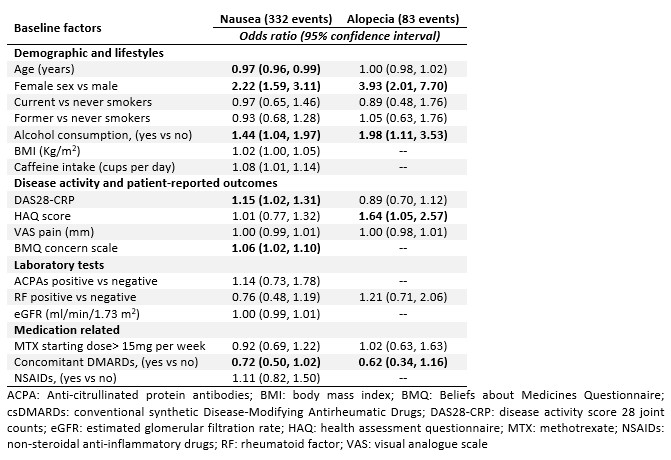Session Information
Date: Monday, November 8, 2021
Title: Abstracts: RA – Treatments II: New Findings in Established Therapies (1442–1445)
Session Type: Abstract Session
Session Time: 2:30PM-2:45PM
Background/Purpose: Methotrexate (MTX) is the first-line treatment in the management of patients with rheumatoid arthritis (RA) due to its good efficacy. However, certain adverse events, such as nausea and alopecia, often create considerable concerns to patients starting the treatment, and could affect their quality of life. This may result in non-adherence to MTX or permanent discontinuation of treatment in the early period following the start of MTX. This study aimed to summarise the prevalence rates nausea and alopecia, and identify baseline factors associated with the development of these adverse events over the first year of MTX treatment.
Methods: The Rheumatoid Arthritis Medication Study (RAMS) is a multi-centre prospective cohort study of patients with RA commencing MTX for the first time. Relevant demographic, clinical and medication related data were collected at baseline (Table). Adverse events were reported at six- and twelve-month follow-ups. The prevalence rates of nausea and alopecia were calculated based on the proportions of patients who reported having an adverse event within one year of follow-up. Multivariable logistic regression analyses were performed to assess the associations between candidate baseline predictors and nausea or alopecia.
Results: A total of 1069 patients with early RA were included in this analysis. The mean age at the start of MTX was 59.2 (SD: 13.5) years, 65.3% were women, and the mean duration of symptom was 7.7 (SD: 5.6) months. Around one third of the patients (31.1%) reported nausea over the first year of treatment with MTX. Alopecia was reported by 83 patients (7.8%).
Women were more likely to report nausea and alopecia compared with men, odds ratios (ORs) were 2.22 (95%CI: 1.59 to 3.11) and 3.93 (95%CI: 2.01 to 7.70), respectively (Table). Older age was associated with decreased odds of reporting nausea, OR 0.97 (95%CI: 0.96 to 0.99). Alcohol consumption was associated with increased odds of developing nausea and alopecia, ORs were 1.44 (95%CI: 1.04 to 1.97) and 1.98 (95%CI: 1.11 to 3.53), respectively. Higher Disease Activity Score and Belief about Medication Questionnaire – Concern scale at baseline were associated with increased odds of nausea. The use of concomitant csDAMRDs with MTX at baseline was associated with less reporting of nausea and alopecia.
Conclusion: Identifying factors associated with adverse event occurrence could help alleviate patients’ concerns and improve adherence to MTX. Limiting alcohol consumption may influence the likelihood of developing MTX-related adverse events.
 Table: Baseline factors associated with the development of nausea and alopecia
Table: Baseline factors associated with the development of nausea and alopecia
To cite this abstract in AMA style:
Sherbini A, Gwinnutt J, Hyrich K, Verstappen S. Baseline Factors Associated with the Development of Nausea and Alopecia over One Year in Patients Starting Methotrexate for Rheumatoid Arthritis [abstract]. Arthritis Rheumatol. 2021; 73 (suppl 9). https://acrabstracts.org/abstract/baseline-factors-associated-with-the-development-of-nausea-and-alopecia-over-one-year-in-patients-starting-methotrexate-for-rheumatoid-arthritis/. Accessed .« Back to ACR Convergence 2021
ACR Meeting Abstracts - https://acrabstracts.org/abstract/baseline-factors-associated-with-the-development-of-nausea-and-alopecia-over-one-year-in-patients-starting-methotrexate-for-rheumatoid-arthritis/
